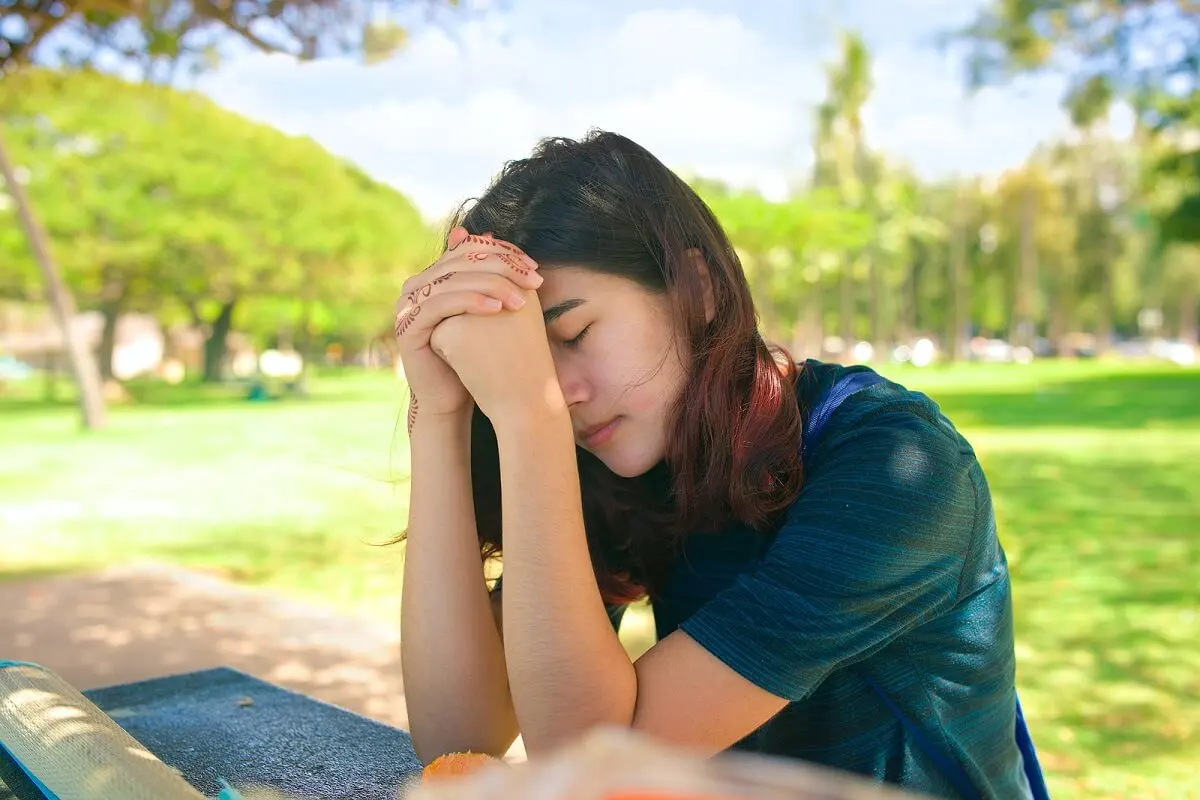Summer Depression: Causes, Symptoms and How to Deal With It


Written and verified by the psychologist Maria Fatima Seppi Vinuales
Perhaps most of us associate sadness, listlessness, or the desire to stay cooped up and not go out with a season such as winter. While seasonal depression tends to be more prevalent in that season, there’s also such a thing as summer depression.
For almost everyone, the summer season means going out and spending days outdoors, at social gatherings, the pool, the beach, and many other places. However, for others, thinking about what is happening “out there” causes discomfort or what’s known as “seasonal affective disorder“. Want to know more about it?
Symptoms of summer depression
According to a publication in the journal Psychiatry, between 10 and 20% of cases of recurrent depression follow a seasonal pattern. And while it isn’t as recurrent in the summer as it is during the fall or winter, many cases do occur. The main symptoms are as follows:
- Exhaustion or fatigue. One of the causes is the quantity and quality of sleep. It has to do with the fact that the days are longer and many people stay up later and sleep less. In addition, their sleep is interrupted because the nights are often hot. The circadian rhythm with sleep-wake cycles is impacted by daylight hours.
- Slowing down. Excessive heat causes everything to develop at a slower pace, because the truth is that the human brain, with temperatures of 36 degrees, starts to be affected. Performance and productivity is lower, together with the factor linked to rest, which we already mentioned.
- Anxiety. In many people, the feeling of “doing nothing” in summer causes them great discomfort, a feeling that time is being wasted. This increases because many public institutions close their doors, which puts many activities and procedures on hold.
- Nervousness or irritability.
- A loss of appetite. There may be less desire to eat.
- In some severe cases, there may be feelings of death, with suicidal thoughts.
It’s important to note how long these symptoms last, as, at first, it may be just a temporary period of feeling a bit down. However, if they last longer than two weeks, it’s best to see a specialist.

Why does summer depression occur?
There’s no specific cause for summer depression. Instead, we must analyze a series of factors involved in the biological area, as well as the individual-personal and social aspects. Regarding the biological, we have already mentioned the impact that heat has on the body.
On the other hand, a symptom such as stress – mentioned above – also increases in summer. In particular, it’s associated with the closing of cycles and everything involved in going on vacation. Leaving the house in order, preparing suitcases, buying tickets, and other tasks all come together on these hot days, which ends up causing stress.
The truth is that our routine gives us order in our day-to-day lives. In summer, obligations and schedules become fewer, and, consequently, some people experience that feeling of loss of control that prevents them from connecting with enjoyment.
In turn, seeing pictures on social networks of people having a good time, and groups of friends and families together can be detrimental in many. This can be interpreted as a sign of loneliness, something that during the rest of the year can be concealed by the weight of daily obligations.
The amount of light also has an influence. Even though, for most people, more light is a protective factor, some people have an inverted response to light. This means that they become depressed if the days are longer and brighter.
Also, the social pressure of having to love the summer means that many people don’t understand the discomfort that others may be feeling. Finally, the economic factor also plays a role. Summer is a time when we spend more money, either on vacation or going out more often.
Faced with this situation, not everyone has the same resources, and some people even get into debt. Thus, pressure and stress build up and end up affecting people.
You may be interested in: 6 Things You Should Avoid Doing in Summer
Groups and risk factors
Summer depression, or seasonal affective disorder, is one of the recognized types of depression, and doesn’t affect all people equally. Although there’s a higher prevalence in women, other groups are also affected. Among them, we find the following:
- Elderly people and those who require more frequent care. They are the main ones affected, since, in general, their social support network starts to be altered due to the beginning of the vacations. This increases the feeling of loneliness and isolation, even if it’s only for a few weeks.
- Women who look after others. This group of women is also often affected by summer depression. They tend to be used to taking care of others, thinking little of themselves during the year. This causes them to feel lonely and useless when children or other family members go on vacation.
- Adolescents. At an age when the peer group means everything, physical separation is an intervening factor for depression. Spending weeks apart from friends can lead to the feeling that summer isn’t as enjoyable.
- People who tend to be multitaskers and have a hectic pace of work during the rest of the year often find it difficult to “find themselves” and find something to do in the summer. Moreover, as they aren’t used to disconnecting, they don’t find much sense in “lying down to do nothing”. This is often a source of conflict in families or couples for those who are able and willing to spend time together.
- Summer is also a time that affects people who have a problem with their body or are unhappy with it in some way. The oppressive weather is an invitation to wear lighter clothes, in addition to the pressure of what a perfect and beautiful body means socially. Thus, some people -most of them women- would like to be able to enjoy themselves at the pool or at the beach, but don’t feel at ease with other people looking at them. The same is true for those who have sweating problems, whose discomfort is increased by high temperatures.

You may be interested in: 5 Useful Ways to Handle Depression
Treatment and advice
Some of the recommendations and healthy habits that can be kept in mind to make the summer season more bearable are the following:
- The sun is necessary because it brings vitamin D to the body and avoiding it isn’t ideal either. Instead, what you can do is get some sun early in the day. This avoids exposure to aggressive rays.
- Stay hydrated. Always carry water or a drink with you to avoid dehydration.
- Get enough sleep. With the arrival of summer, it’s common for people to sleep less. Therefore, we must take the necessary actions to ensure a good rest. For example, do some relaxing activity before going to sleep, avoid screens during the night, and find a quiet and comfortable place.
- Avoid suspending daily activities, but rather reschedule them. Because of the heat, many people stop exercising, which causes them great discomfort. It’s best not to interrupt it, but to try to find a time when the heat isn’t so intense, for example, at the end of the day. Similarly, those who suffer from the heat, but like to meet with friends, may choose to change schedules or choose cool places for the meeting.
- It’s also advisable to try to maintain a routine during the day.
- Avoid extreme temperatures and alterations in the light pattern. Ideally, stay in cool places during the hottest hours and sleep in total darkness. In some cases, it may even be useful to wear special sunglasses in the late afternoon, but you should consult your doctor about this.
- See a specialist. If you notice that you’re getting depressed, seek help immediately. Don’t wait until you get worse and worse, as the solution may be much more difficult if you let time pass.
Heat, sun, and medication
On the other hand, if you’re receiving pharmacological treatment for depression, it’s important to keep in mind that some medication can affect the sweating capacity, producing dryness of the skin and mucous membranes and worsening the internal temperature control. In these cases, the ideal thing is to avoid high temperatures and to hydrate well.
In addition, antidepressants (especially the old ones) can cause photosensitivity, so that prolonged exposure to the sun could produce skin reactions. Because of this, it’s recommended to use a good sunscreen.
Depression is more than a “slump”
We shouldn’t underestimate the importance of a malaise such as depression, as sometimes it isn’t simply a matter of “feeling down”. Sometimes, consultations or requests for help come after several months of discomfort, so the difficulty in addressing it is even greater. It’s better not to rely on the thought that “it will pass”, and, instead, give your mental health the place it deserves.
Excessive heat is something that affects all of us emotionally, especially if many are having a good time while others are working. Irritability and listlessness are present, but they’re intermittent, not permanent.
Because of this, it’s important to pay attention to how long the symptoms last, as it isn’t always something temporary, but something that’s always present and that increases at certain times. However, it’s best to consult a professional for clarification and treatment.
All cited sources were thoroughly reviewed by our team to ensure their quality, reliability, currency, and validity. The bibliography of this article was considered reliable and of academic or scientific accuracy.
- Gatón Moreno, M. A., González Torres, M. Á., & Gaviria, M. (2015). Trastornos afectivos estacionales,” winter blues”. Revista de la Asociación Española de Neuropsiquiatría, 35(126), 367-380.
- Roecklein KA, Rohan KJ. Seasonal affective disorder: an overview and update. Psychiatry (Edgmont). 2005;2(1):20-26.
- Melrose S. Seasonal Affective Disorder: An Overview of Assessment and Treatment Approaches. Depress Res Treat. 2015;2015:178564. doi:10.1155/2015/178564
- Behar, R., Arriagada, M. I., & Casanova, D. (2005). Trastornos de la conducta alimentaria y trastornos afectivos: Un estudio comparativo. Revista médica de Chile, 133(12), 1407-1414.
This text is provided for informational purposes only and does not replace consultation with a professional. If in doubt, consult your specialist.








